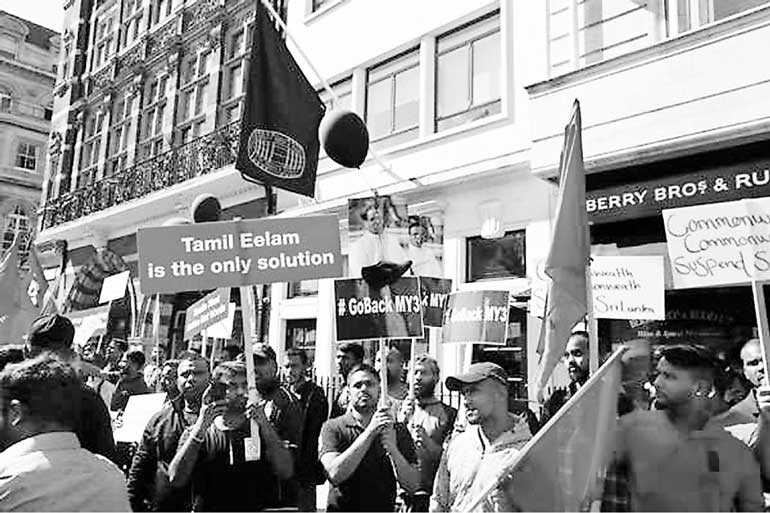Thursday Feb 19, 2026
Thursday Feb 19, 2026
Saturday, 21 April 2018 00:00 - - {{hitsCtrl.values.hits}}

Thousands of Tamils rallied against President Maithripala Sirisena’s visit to London shouting “go back, Maithri” and carrying “#GoBackMY3” signs. The President is in London to attend Commonwealth Heads of Government’s meeting.
Several demonstrators carried signs urging Commonwealth Heads of Government (CHOGM) to suspend Sri Lanka from the Commonwealth, until the Government fully implements the recommendations made by the UN Human Rights Council Resolution L 30/1 (due by March 2019).
Failing this, Sri Lanka should be referred to the International Criminal Court (ICC) and a UN Conducted Referendum should be conducted for the Tamils to decide their future destiny, to ensure a peaceful, permanent political solution.
Repeated concerns have been raised about the slow progress occurring in Sri Lanka with regards to implementing the recommendations of the L 30/1 UN Human Rights Council resolution. Despite a two year extension, very little progress has been made during the period between March 2017 and January 2018, with doubts about whether Sri Lanka will be able to implement the UNHRC’s recommendations before March 2019. However, despite continued stalling and the lack of commitment by the Sri Lankan Government, few consequences have been delivered to them for failing to fulfil these commitments.
Sri Lanka denies any wrongdoing, despite clear and mounting evidence from various sources. These include the report by the Panel of Experts appointed by the then UN Secretary General Ban Ki-Moon, the U.N. Internal Review Report (‘Charles Petrie Report’), the findings of the Dublin People’s Tribunal, the Channel 4’s No-Fire-Zone documentary, and the numerous UN Special Rapporteurs and INGO reports. These have all established that the Government of Sri Lanka committed heinous war crimes and crimes against humanity even during the final stages of the armed conflict in 2009.
As demonstrated recently by the statements released by the UN High Commissioner for Human Rights Zeid Ra’ad Al Hussein, as well as by Deputy High Commissioner Kate Gilmore, the international community has become aware of Sri Lanka’s deceptive acts.
In 1974 when the Commonwealth Conference took place in Sri Lanka, the President of the main Tamil political party the Tamil United Liberation Front, the late S.J.V. Chelvanayagam QC, presented a memorandum to the delegates of the Commonwealth Conference narrating the racial discrimination against, and persecution of the Tamils.
The submission concluded: “ It is our hope that the problems of the Tamils of Ceylon will receive the sympathetic consideration of the delegates assembled at this Conference and that they will use their good offices to help the resolution of the problem.” The Commonwealth, which is committed to ending racial oppression, turned a blind eye in 1974.
Since then, the Government of Sri Lanka has continued to violate the human rights of Tamils systematically and pervasively on account of their ethnicity. During the final six months of the war alone over 70 thousand Tamils were killed and Tamil women were sexually assaulted and raped by Sri Lankan Security Forces. Even after the war ended in 2009, abuses against Tamils are still continuing.
Here are some points:
1. There is no political solution to the country’s ethnic conflict anywhere in sight.
2. The Government has not taken any credible steps so far to ensure accountability for the numerous allegations of war crimes and crimes against humanity identified in the April 2011 report of the Secretary General’s Panel of Experts on Accountability in Sri Lanka or on the UN HRC Resolutions.
3. The process of reconciliation that the Sri Lankan Government promises has not been demonstrated; and they have failed to implement the resolution’s recommendations
4. Since the end of the civil war, military camps and ‘High Security Zones’ have dotted the Tamils areas and the army has taken control over civilian rule. Political and prisoners of war are still languishing in prisons, the Prevention of Terrorism Act (PTA) which primarily targets Tamils has not been repealed, and lists of missing persons and enforced disappearances are yet to be released.
5. The Sri Lankan Government has turned a blind eye to the ongoing attacks on yet another minority population – the Muslims, who have been physically assaulted, their properties set on fire and businesses destroyed by Sinhala racists and extremists. It is clear that this is a regime that will keep on indulging in genocidal violence against sections of its own population unless reined in by the global community.